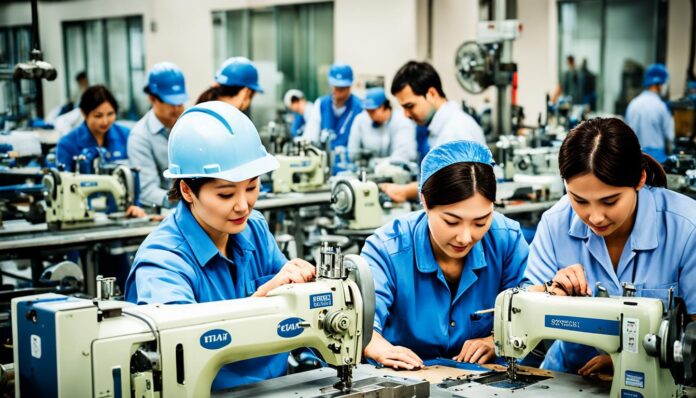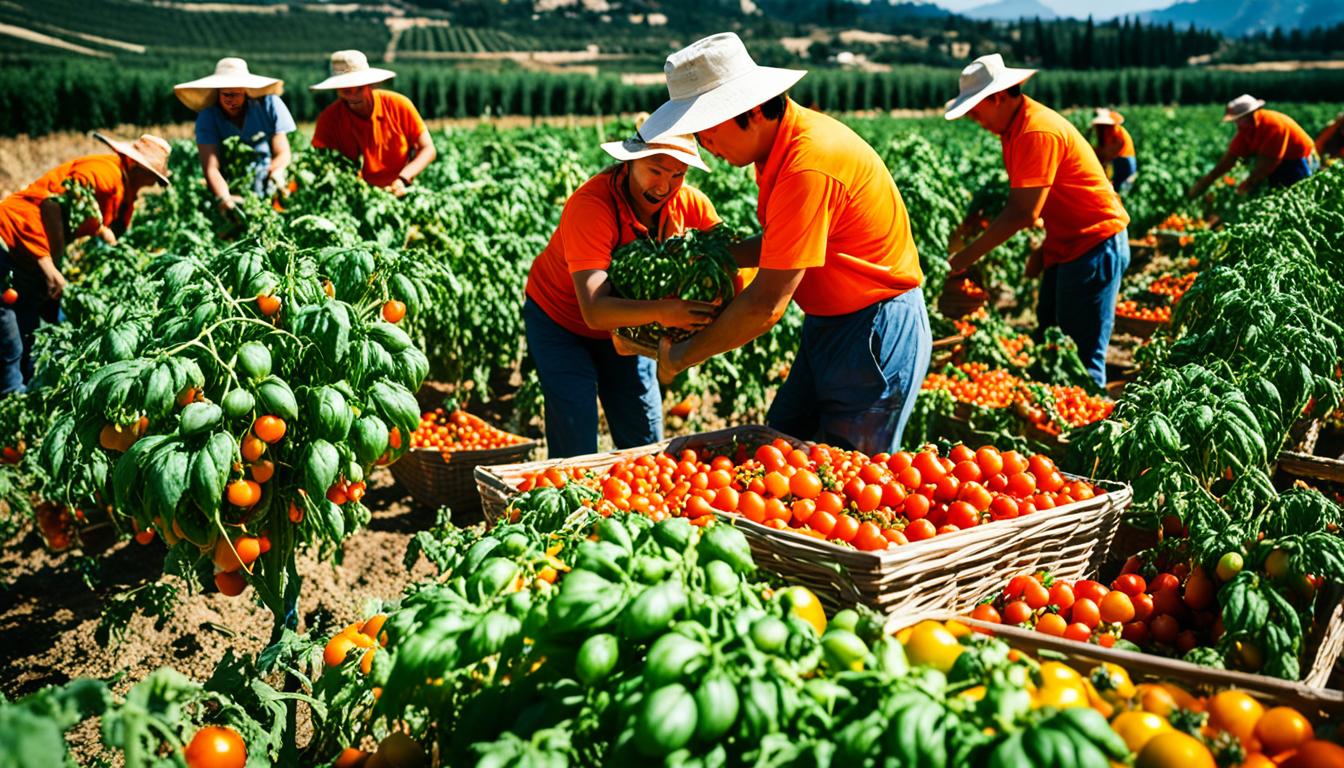
Wondered how Chinese workers change Italy’s famous fashion and farm scenes? Places like Prato in Italy see big changes. Chinese business owners now lead many fashion companies. They even work with top designer names like Giorgio Armani and Dolce & Gabbana.
The impact of these shifts on Italy’s economy and culture is deep. This story makes us think about the future of Italian work and life. So, how did Chinese workers get so important in Italy’s beloved industries?
This shift raises key questions about how and why. How have Chinese workers managed to gain such a dominant foothold in Italy’s most cherished industries?
Key Takeaways
- Chinese migrant workers now run the majority of textiles and apparel companies in Prato, Italy, even subcontracting for leading fashion brands.
- The success of Chinese entrepreneurs in Italy is due to the synchronicity between their business approach and the demands of Italy’s local, family-based, small-batch production environment.
- Chinese entry into these sectors has revitalized industries that were once in decline, but also prompted concerns among native Italians about the potential impact on the country’s economy and way of life.
- The Chinese immigrant community in Italy has adapted and contributed to the country’s growing diversity, despite facing challenges and social tensions.
- Understanding the factors behind the Chinese success in Italy provides valuable insights into the complex dynamics of globalization, cultural integration, and the evolving nature of work and industry.
The Rise of Chinese Entrepreneurship in Italy
Before the Chinese arrived in Italy in the 1980s, the country was already known for its textile industry. Prato, in particular, was famous for producing high-quality wool. When competition from Japan and Eastern Europe increased in the 1950s, Prato’s producers responded by introducing new fabrics, like tessuti fantasia, to outshine their rivals.
Economic Restructuring and the Decline of Italy’s Textile Industry
The Italian textile industry faced big changes due to several key factors. These include Italy’s shifting population, vague immigration rules, and China’s return to the global market after Mao Zedong. This created a unique situation, allowing Chinese entrepreneurs to find their place in Italy.
Post-Mao Reforms and Chinese Integration into the Global Economy
The unique success of the Chinese in Italy comes from fitting perfectly into the local business scene. They excel because their way of doing business matches what Italy’s textile and apparel sector needs. This shows how well they adapted to Italy’s style of family-focused, small-scale production.

Chinese Workers Leave Their Mark on Italy’s Fashion and Agriculture Sectors
In Prato’s busy streets, you can hear Chinese being spoken and see Chinese-owned shops. The macrolotto industriale is one part where this change is clear. Here, many companies that make clothes are run by Chinese people. They even work with big fashion names like Giorgio Armani and Dolce & Gabbana.
The shift in who runs these businesses is dramatic. Italian products that were once made by Italians from the South are now often made by the Chinese. This change a few years back would have seemed impossible. But, the Chinese have breathed new life into areas that were slowly fading away.
| Sector | Impact |
|---|---|
| Fashion | Chinese businesspeople now run the vast majority of companies in the textiles-apparel sector in Prato, subcontracting for leading design houses |
| Agriculture | Chinese workers have become integral to Italy’s agricultural labor force, revitalizing the sector |
This turning point puts a spotlight on something truly amazing. Chinese businesspeople now oversee most fashion related companies in Prato. They also partner with top design names. The impact is large, and cool brands like Giorgio Armani and Dolce & Gabbana see this too. Before, it was mostly Italians shifting these gears.

The Dynamics of Chinese Immigrant Communities
Chinese immigrants in Italy used their kinship networks and native-place networks for social capital. These connections gave them vital info, money, and help, which they needed to do well in Italy.
Kinship and Native-Place Networks as Social Capital
Overlapping networks of family and friends from the same place helped the Chinese immigrants. They shared tips, money, and work. This helped them get started in Italy’s work fields. Such help was key for them in a new country.
Adaptation Strategies and Overcoming Challenges
Between 2007 and 2010, researchers learned a lot by talking to seventy-four Chinese immigrants in Italy. They found out about the tough economic challenges the Chinese faced. They also studied the creative ways the Chinese used to overcome these barriers.
Even with hard competition and facing outmoded policies, the Chinese people stayed strong. They added a lot to Italy’s culture and society.
The Impact on Contemporary Italian Society
Chinese workers have changed Italy’s fashion and farming fields deeply. They brought new life to industries, making more jobs for both groups. But, the quick rise of the Chinese in Italy worries some native Italians. They fear it could harm the economy and their way of life.
Economic Revitalization and Job Creation
The arrival of Chinese workers made a big difference in fading sectors like textiles and clothes. Their hard work and fresh ideas have boosted these parts, helping everyone find work. This change has been really good for the Italian economy. It shows the power of mixing different cultures and sharing ideas.
Cultural Integration and Societal Tensions
However, this fast change is causing worries among Italians. They’re afraid Chinese success could change Italy’s culture and old life ways. These worries show that Italians and Chinese need to talk more. It’s important to celebrate cultural mix and deal with real concerns to keep Italy’s unique identity.
Conclusion
Chinese workers have made a big impact on Italy’s fashion and farming areas. This story shows us a lot about today’s world and how different cultures mix. It helps us see the good and not so good sides of these changes on Italy’s society and economy.
The reason behind the Chinese success in Italy seems to be luck at first. But it’s really about how their way of doing business fits well with Italy’s need for family-run, unique products. This match has let them boost struggling industries and offer new jobs.
The growth of the Chinese group has worried some Italians about their culture and economy. But as Italy deals with these challenges, it’s become clear the Chinese there are adapting well. They are adding to a more diverse and rich society, even when faced with tough competition and old ways of doing things.
This research brings out the deep connection between moving to a new country, starting businesses, and sharing cultures. As we move forward, the Chinese experience in Italy’s key sectors will guide our decisions. It will help us make a world economy that’s fair and more open to everyone.
FAQ
How have Chinese immigrants impacted Italy’s fashion and agriculture sectors?
Chinese immigrants have made a big impact on Italy’s fashion industry, especially in Prato. Now, most companies in this section are run by them. They even work with big designers like Giorgio Armani and Dolce & Gabbana.
Before, Italians made these products. But today, it’s more common to see Chinese migrants working.
What factors contributed to the success of Chinese entrepreneurs in Italy?
Chinese business people in Italy found success because their way of working fits well with Italy’s local production style. They use their family and hometown connections to get information, money, and people to work with. This helps them do well in Italy.
How have native Italians responded to the rise of Chinese businesses?
As Chinese businesses grow, Italians worry about their own economy and lifestyle. They are afraid the success of Chinese businesses might hurt Italy. They fear this might lead to the loss of Italian jobs and companies.
What are the broader societal impacts of Chinese immigration in Italy?
The Chinese have helped the Italian fashion and farming industries grow again. But, their achievements have also caused tension and challenges. Italy is working hard to keep the good parts of Chinese immigration while dealing with problems it causes.
